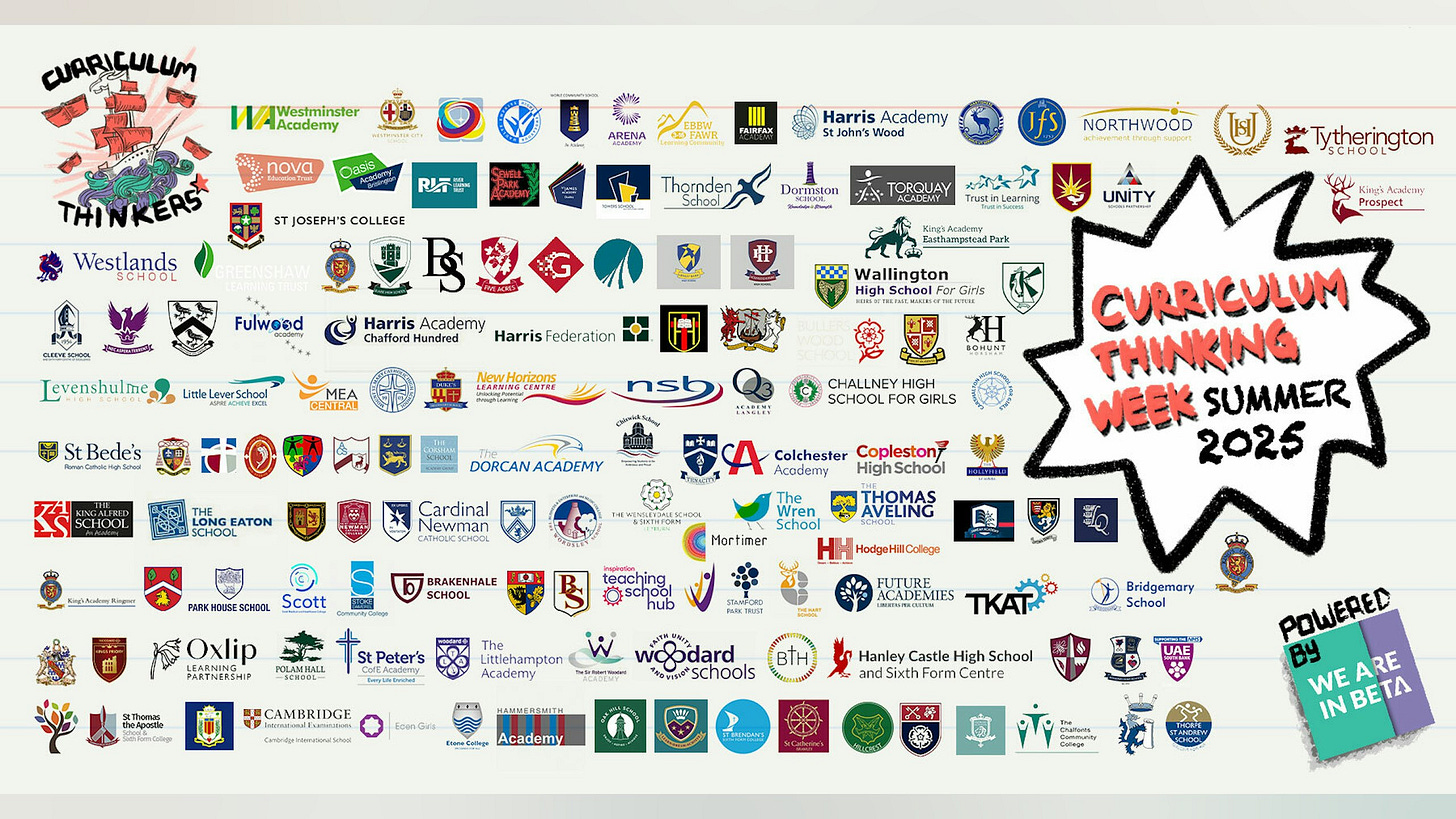Reading scaffold
What to do ‘pre’, ‘during’ and ‘post reading’? Plus: subject successes; and schools with reading cultures.
Reading well is a more important indicator of success than socio-economic or educational status of parents (OECD/PISA 2009).
A recent major study also showed a ‘significant correlation’ between reading ability and GCSE results across all subjects (GL Assessment, 2020). This is just as strong in Maths & Sciences as it is in Arts, Humanities and English.
It’s clear reading is a problem worth solving.
But how can you solve it in your subject?
This week’s highlights from the We Are In Beta will help you learn how some of our members are approaching disciplinary literacy to achieve significant improvements in Progress.
We - schools - Are In Beta - always learning (when are intentional about how we approaching reading in our subjects)
This week
📖 Disciplinary Reading: what to do ‘pre’, ‘during’ and ‘post reading’?
🎫 Curriculum Thinking Week 2025: subject successes
🔬15 schools creating a culture of reading
📖 Disciplinary reading: what to do ‘pre’, ‘during’ and ‘post reading’?
Developing students’ ability to read complex academic texts in your subject is hard.
First, you have to choose the right text to meet your lesson (a curriculum) aims, which is a big (and nuanced) job in itself.
Then you have to know how to include it successfully in a lesson. Again - not easy.
Last week, Ciara Sutton (Head ITT, literacy expert and English teacher at Future Academies), shared some the reading strategies that led her to say this:
“Schools, who put reading instruction at the heart of lots of their subjects, get Progress 8 scores of +1. If you invest in this overtime, I’ve seen it, over a couple of years, give up to 0.4 Progress 8 score improvement average”.
One of those strategies is called a ‘Scaffolded Reading Experience’ (Graves and Graves 1994).
The key idea is that teachers need to prepare how they will guide pupils through a reading.
More specifically, thinking about what students are doing, and thinking about, ‘pre’, ‘during’, and ‘post-reading’.
How does it work and what do you need do at each stage?
Here’s an abridged summary of the training material she ran through in detail here.
1. Pre-reading
Before reading a text you need to:
a) Activate prior knowledge
Assess the prerequisite knowledge
What prior knowledge do students have to support them in accessing this reading?
What background knowledge can we activate to support pupils?
b) Frontload Vocabulary Instruction
Which pieces of vocabulary will you explicitly teach pupils before reading?
Explicit Vocabulary Instruction
Pre-teach a word that can unlock the text and provide a focus
c) Frontload Exposition
Use verbal exposition to pre-teach the core knowledge needed to make sense of the reading and/or that is core to using the reading in your subject.
2. During Reading
While reading the text, you need to use:
a) Checks for Listening
We need to direct student attention during reading, and check their listening.
Chunk the reading: These should also act as scaffolds for comprehension by signalling important sections of the text and checking for listening at this point.
b) Embedded Vocabulary Instruction
There will be words for which we add a short, contextualised definition to support with understanding
Adding ‘bracketed’ meaning
c) Knowledge Embellishments
We may need to supplement student knowledge by pausing and adding knowledge as a form of added exposition.
Quick, Contextualised
d) Model Reading
Make your implicit expert reading skills more explicit.
Metacognitive talk to say things like: “I notice…” “This reminds me of …” “I remember…” “This links to…” “I know this means…”
3) Post Reading
After reading the text, you need to:
a) Check for understanding
Check students have understood key knowledge in the texts
Ask question like: “What happened when X?” “Why did Y happen?” “Summarise the process here.”
b) Promote student thinking
Craft questions that ask students to make connections with what they have read with what they already know.
Craft questions that ask students to think deeply about the meaning of what they have read.
c) Elaborate
Ensure students think hard by asking them “how” and “why” questions.
To expose their thinking, to elaborate on the knowledge and Tto stretch the connections they are making
If you’re looking to improve reading in your subject, Ciara shares how to plan for and deliver a ‘Scaffolded Reading Experience’ here in the second part of The Secondary Reading Series by Future Academies.
Want to join is for Part 3?
“Disciplinary Literacy: High Leverage Approaches to Oracy and Vocabulary”
📆 Mon 23rd June
🕓 4:30pm
🎫 Curriculum Thinking Week 2025: subject successes
The window for subject specialists to share outlines of their Curriculum Thinking Week 25 sessions and upload recordings and resources is now open.
So far our incredibly generous members have submitted 75+ sessions, about how they are achieving success in their subjects across 15 subjects.
Here’s a reminder of the dates and links you need if you are speaking/supporting colleagues’ submissions:
By Monday 23th June - share your session outline in this form
By Friday 27th June - record your session, and when it is ready, upload video, slides and docs
w/c 7th July – conference goes live! Jump in to meet fellow speakers, discuss sessions and learn from a wealth of ideas and resources on offer.
🎫 Register for Curriculum Thinking Week 2025 before 29th June
Curriculum Thinking Week is free to attend. But only between 7th July and 11th July.
After that, it is only available to paying members of the Curriculum Thinkers Community.
Register before 29th June to make sure you don’t miss out.
🔬15 schools creating a culture of reading
Over the past couple weeks, we’ve seen a flurry of interest in this piece of research revealed what 15 high performing schools in areas of significant deprivation are doing to create cultures of reading.
On a personal note.
Thinking about reading stirs feelings of discomfort for me.
I have always found reading hard. I have always struggled to parse what I am seeing and what I thinking well enough or quick enough.
As a student, I used to dread being asked to read aloud because the mistakes and delays always reared their ugly heads in what came out in my mouth.
As a teacher, the idea of reading to my classes made me nervous too. What if I stumble over my words? Or get the emphasis of a sentence wrong? How embarrassing.
Looking back, I wish my teachers had been trained in the techniques above. And I wish I have been trained on them too.
So, I can’t recommend watching Ciara’s session enough. She is true expert, who has put in the miles.
Your planning will improve. Your delivery will improve. Your students will thank you.
Thanks for reading.
@NiallAlcock and the We Are In Beta team
Sent this by a friend?
📱 Get 19,974 school leaders and teachers in your pocket - download We Are In Beta.
🚀 Looking for a new role? Get updates about specific jobs you’re looking for before anyone else.
🆕 New here? Catch up with previous editions, podcasts and webinars via the archive.





